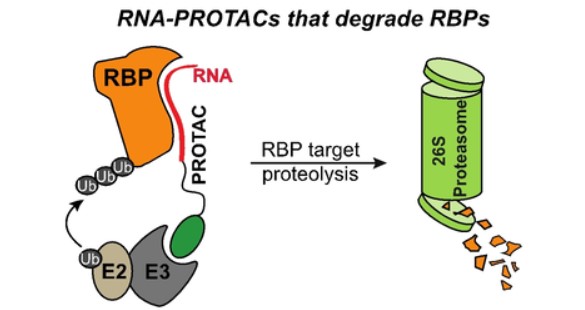Proteolysis targeting chimera (PROTAC) is a representative technology of targeted protein degradation (TPD), however, the application of PROTAC is limited by the fact that the ligands that bind to target proteins are usually identified through high-throughput screening and design, and the development of small molecule ligands is difficult. Recently, RNA-based PROTAC has opened up new ways to degrade targets and expand the range of target proteins.
RNA-PROTAC has received much attention from the scientific and pharmaceutical industries as an alternative PROTAC approach and as a derivative form of nucleic acid-based drugs. BOC Sciences is a leading CRO focused on providing innovative solutions for TPD. We have the capability to provide RNA-PROTAC technology development services.
Introduction
RNA-PROTACs are novel chimeric structures that mediate the proteasomal degradation of RNA binding proteins (RBPs). Similar in structure to PROTACs, RNA-PROTACs contain three components: the RBP-binding unit (i.e., RNA), the ubiquitin E3 ligase recruitment ligand, and the linker. When designing RNA-PROTAC, a short RNA that is homologous to the RNA consensus binding element (RBE) of RBP can be selected as the targeting part; the targeting ligand of E3 ligase could be small molecule or peptide.
RNA binding proteins (RBPs) belong to a specific class of nucleic acid interacting factors involved in a variety of important cellular processes. The functional defects in RBPs are at the root of many diseases and RBPs are potentially important targets. The lack of conventional enzyme pockets that can effectively bind small molecules and the presence of their homologous protein structural domains in most RBPs lead to limited activity of small molecules acting on RBPs. On the other hand, RBPs can bind to RNA in a dynamic, coordinated and sequence-selective manner to form ribonucleoprotein (RNP) complexes that play a key role in RNA-dependent processes. Thus, the RNA-binding sites of RBPs represent viable targets for drugs.
 Fig. 1 RNA-PROTACs degrade RBPs using ubiquitin-proteasome system (Alice Ghidini, 2020)
Fig. 1 RNA-PROTACs degrade RBPs using ubiquitin-proteasome system (Alice Ghidini, 2020)
RNA-PROTACs Currently in Development
Although nucleic acid-based TPD strategies are advancing rapidly, and RNA-PROTACs have been proposed as one of these strategies, small molecule PROTACs are still the mainstream at present. RNA-PROTACs are just budding, and their emergence has provided new a new insight into TPD and broadens the boundaries of TPD. In 2021, Jonathan Hall's group first proposed the RNA-based PROTACs were designed and successfully constructed to target RBPs. The RNA-PROTACs were designed to degrade two RBPs: a stem cell factor LIN28 (Lin28A) and the splicing factor RBFOX1. Although RNA-PROTAC is an exciting method for degrading RBPs, it still has some drawbacks, such as the instability of RNA oligomers in vivo and the need for RNA secondary structures to properly interact with RBPs.
Our Services
- RNA sequence screening for targeting RBPs
- Linker optimization and selection
- Identification of RNA binding sites
- Synthesis of small molecule ligands
- Construction of RNA-PROTACs molecules
- RNA-PROTACs activity testing
- Target RBPs degradation assay
Our Advantages
- Well-established platform of RNA-based PROTACs
- Experienced drug development team
- Close contact with clients to discuss project progress
- Data analysis, detailed report with results and discussion
- Highly reliable and reproducible results
- Short turnaround time and competitive pricing
Reference
- Alice Ghidini, A., et al. RNA-PROTACs: Degraders of RNA-Binding Proteins, Angew. Chem. Int. Ed., 2021, 60, 3163-3169.

 Fig. 1 RNA-PROTACs degrade RBPs using ubiquitin-proteasome system (Alice Ghidini, 2020)
Fig. 1 RNA-PROTACs degrade RBPs using ubiquitin-proteasome system (Alice Ghidini, 2020)